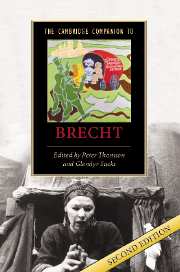Book contents
- Frontmatter
- Part I Context and Life
- Part II The Plays
- Part III Theories and Practices
- 12 Brecht and the Berliner Ensemble - the making of a model
- 13 Revolutionising theatre: Brecht’s reinvention of the dramaturg
- 14 Key words in Brecht’s theory and practice of theatre
- 15 Brecht’s poetry
- 16 Brecht and music: theory and practice
- 17 Brecht and stage design: the Bühnenbildner and the Bühnenbauer
- 18 Actors on Brecht
- 19 Brecht and film
- Bibliography
- Index
- Series List
13 - Revolutionising theatre: Brecht’s reinvention of the dramaturg
from Part III - Theories and Practices
Published online by Cambridge University Press: 28 March 2007
- Frontmatter
- Part I Context and Life
- Part II The Plays
- Part III Theories and Practices
- 12 Brecht and the Berliner Ensemble - the making of a model
- 13 Revolutionising theatre: Brecht’s reinvention of the dramaturg
- 14 Key words in Brecht’s theory and practice of theatre
- 15 Brecht’s poetry
- 16 Brecht and music: theory and practice
- 17 Brecht and stage design: the Bühnenbildner and the Bühnenbauer
- 18 Actors on Brecht
- 19 Brecht and film
- Bibliography
- Index
- Series List
Summary
Brecht, Lessing and dramaturgy
Brecht was the most radical theorist and practitioner of twentieth-century theatre. His methods of writing and developing plays, his training for writers, actors and directors, his interrogation of design and stage lighting, and his collaborations with composers, singers and musicians defined a particular kind of political theatre - and practitioners the world over continue to modify and rework Brecht's theory and praxis to make interventionist theatres of their own. Central to his theatre-making, and the vital motor for the articulation and dissemination of his ideas, is the dramaturg - but curiously this centrality is not highlighted in literature about Brecht. This essay will address that neglect by examining Brecht's own employment as a dramaturg, his writings on dramaturgy, and his organisation and training of dramaturgs within the Berliner Ensemble.
Brecht's reinvention of the dramaturg rewrote a theatrical role first adopted by the German Enlightenment playwright and critic Gotthold Lessing. From 1767 to 1769 Lessing was the official dramaturg at the Hamburg National Theatre and, in an extraordinarily ground-breaking experiment, wrote plays and published critiques of the National Theatre's repertoire, its actors' performances and the creative processes undertaken in each production. Lessing's objective was to articulate the artistic travails normally hidden from the public and to generate a critical discourse on the repertoire and working practices of the institution itself.
- Type
- Chapter
- Information
- The Cambridge Companion to Brecht , pp. 193 - 208Publisher: Cambridge University PressPrint publication year: 2006
- 2
- Cited by

